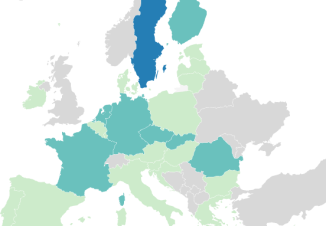On 18 June 2009, the Council Directive 2009/50/EC of 25 May 2009 facilitating conditions of entry and residence in the EU of third-county citizens for the purpose of highly qualified employment was publicized.
This Directive introduces the European Blue Card, which is a residence and employment card for higher educated employees of third countries, and which can be seen as the equivalent of the American “green card.” By doing so, Europe hopes to attract higher educated people from third countries, by installing a fast track procedure for residency and employment and by guaranteeing some social and economic rights.
Preconditions for the Blue Card
The Directive puts forward some general preconditions under which Member States can award a ‘European Blue card’:
- the employee is required to present a valid work contract for highly qualified employment (of at least one year) and meet all professional requirements;
- the gross annual salary may not be less than 1.5 times the average gross annual salary in the concerned Member State. By way of derogation from this rule, for employment in professions which are in particular need, the salary threshold may be as low as 1.2 times the average gross annual salary in the Member State concerned; and
- the employee has to present a valid travel document (or, if required, a valid residence permit) and evidence of health insurance.
Rights of the Blue Card holder
The EU Blue Card will have a standard period of validity of between one and four years, with the possibility of renewal and provides that its holder is entitled to:
- entering and employment in the territory of the Member State issuing the Blue card. For the first two years the access to the labour market will be restricted to the exercise of paid employment which meets the conditions set out above. Furthermore, during the first two years of employment in the Member State concerned, as an EU Blue Card holder, changes in employer shall be subject to the prior authorization in writing of the immigration services. After these two years, Member States may provide those employees with equal treatment vis-à-vis the national citizens with regard to the seeking of highly qualified jobs;
- the Member States must notify the employee in writing of their decision at the latest within 90 days of the application;
- equal treatment with nationals of the Member State issuing the Blue Card as regards working conditions, freedom of association, education and vocational training, recognition of diplomas, provisions in national law regarding the branches of social security and the access to goods and services, amongst other things; and
- after 18 months of legitimate residence in the first Member State, the employee and his family members, can move freely to a second Member State for the purpose of highly qualified employment. Nevertheless that person must present an application for an EU Blue Card as soon as possible and no later than one month after entering the territory of that second Member State.
However, it is up to the Member States to decide whether it will be the employee or the employer who has to apply for the EU Blue Card.
Entry into force?
This Directive has to be transposed into Belgian law at the latest by 19 June 2011 and in principle only takes effect from that point in time.
By introducing this EU Blue Card, for a maximum period of four years, it should be hoped that the administrative procedures to enter a Member State becomes less stringent for higher educated people, as previously third-country citizens had to apply for and obtain a yearly separate residence visa and an employment card.



